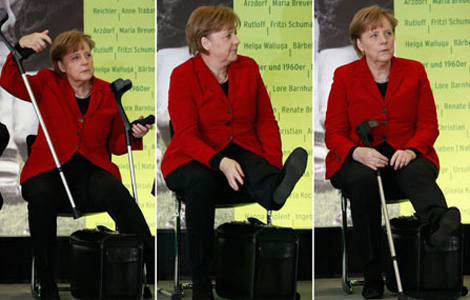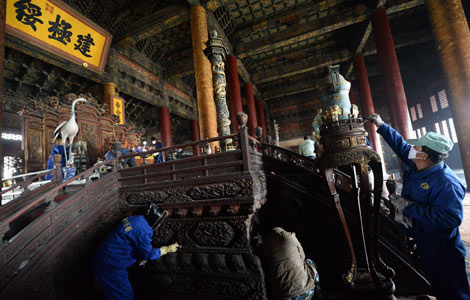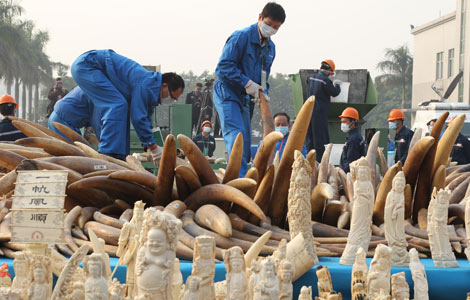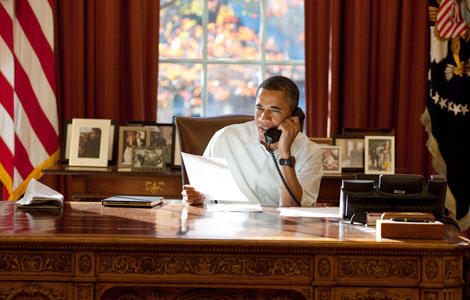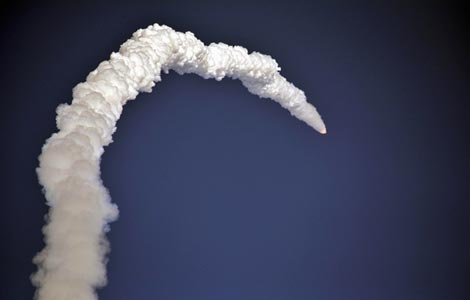Iran rejects US suggestion of Syrian talks role
Updated: 2014-01-07 11:02
(Agencies)
|
||||||||
NO INDICATION
Iran had however given no indication it was ready to take any of these steps, a US official said, and noted there was opposition to Tehran's participation from other nations. The official did not identify these, but they are likely to include Gulf Arab states such as Saudi Arabia, Iran's regional rival.
The US officials, who declined to be named, said Washington still believed it was "less likely than likely" that Iran would play any role at the conference, even on the sidelines, and Iran and the United States had not discussed the matter directly.
State Department spokesman Marie Harf said that for the Iranians even to be considered for any role in the talks "they would have to demonstrate that they would do things that would be less destructive in Syria."
White House spokesman Jay Carney said Iran would have to publicly endorse the terms of the "Geneva I" accord if it wanted to participate in the process.
In remarks quoted by state television, the Iranian foreign ministry's spokeswoman said Tehran supported a political solution to end the Syrian civil war, in which at least 100,000 people have been killed and millions uprooted.
"But in order to take part in the Geneva 2 conference, the Islamic Republic of Iran will not accept any proposal which does not respect its dignity," the spokeswoman, Marzieh Afkham, was quoted as saying.
UN spokesman Farhan Haq said Kerry and Russian Foreign Minister Sergei Lavrov would meet on Jan 13, and voiced the hope they could agree on Iran's participation.
Haq also said the opposition had not yet named members of its delegation for the conference. He said the United Nations urged the Syrian opposition to announce the composition of their "broadly representative" delegation as soon as possible.
REBEL GROUPS
In Syria, rival Islamist rebel groups fought in the city of Raqqa on Monday, residents said, as local fighters tried to drive out a foreign-led al-Qaida affiliate which has also seized towns across the border in Iraq.
Activists opposed to Assad said dozens of Syrian members of the Islamic State of Iraq and the Levant had changed sides to join other Sunni Islamist factions which have taken advantage of a local backlash against the ISIL and the foreign al-Qaida jihadists prominent among its commanders.
The battles in Raqqa, a provincial capital on the Euphrates river in Syria's largely desert east, left bodies clad in the black favoured by al-Qaida fighters lying in the streets. They followed similar violence elsewhere in recent days that have seen the ISIL lose manpower and abandon some of its positions.
"The ISIL has split roughly into two groups - locals who are beginning to defect and foreign fighters who seem intent on going on fighting," Abedelrazzaq Shlas, an opposition activist in the province, told Reuters.
The fighting comes as groups in Iraq identifying themselves as ISIL have seized Sunni Muslim towns hundreds of miles away on the Euphrates in Iraq, challenging a Shi'ite-led government in Baghdad which they see as allied, like Assad, to Shi'ite Iran.
Speaking from Istanbul, Abdallah al-Faraj, a member of the Syrian National Coalition from Raqqa, said the ISIL has been driven out from most of the city and its units were heading to the town of al-Manakhel, 50 km (30 miles) away, where they have a training base and could be re-grouping.
Faraj said although the defeat of the ISIL is strengthening Nusra Front, which is also linked to al-Qaida , the Nusra are seen as a less hardline group, composed of local fighters as opposed to foreigners.
Most Viewed
Editor's Picks

|

|

|

|

|

|
Today's Top News
FBI names arson suspect
Huawei wows Vegas electronics show
Park says ties with China at new high
Economists remain optimistic about Chinese growth
Forbidden City to be closed every Monday
Director questions 3.6m yuan fine
Quality watchdog gives imported food priority
Arrest made in consulate fire in California
US Weekly

|

|

